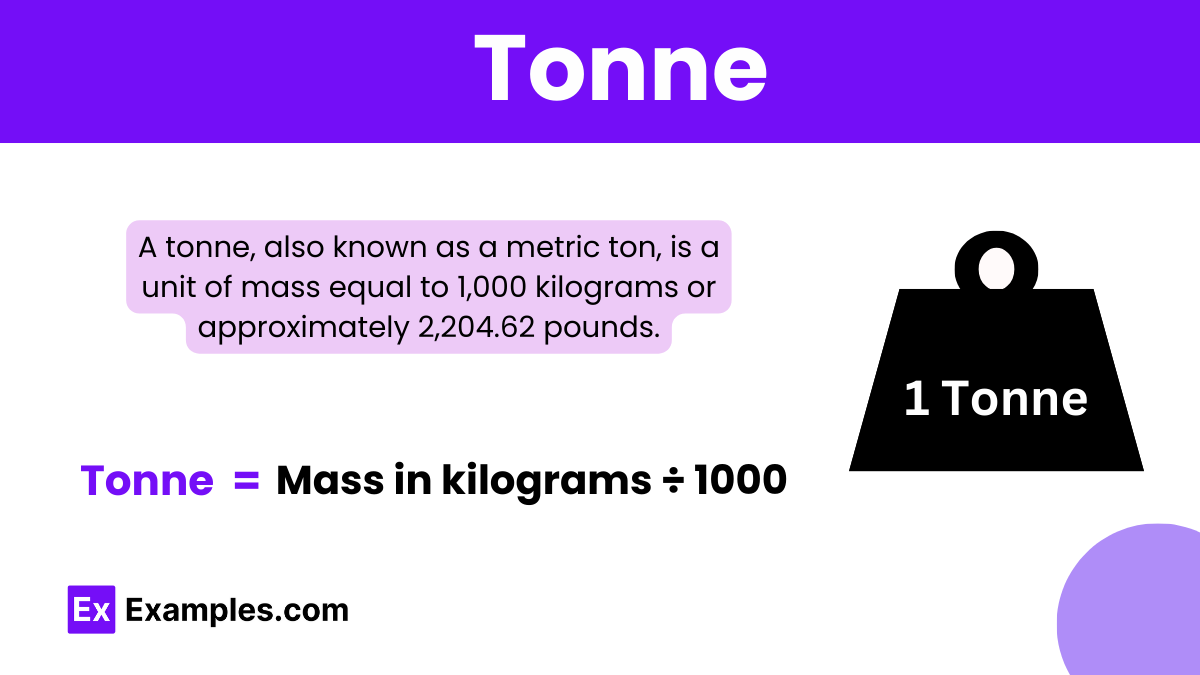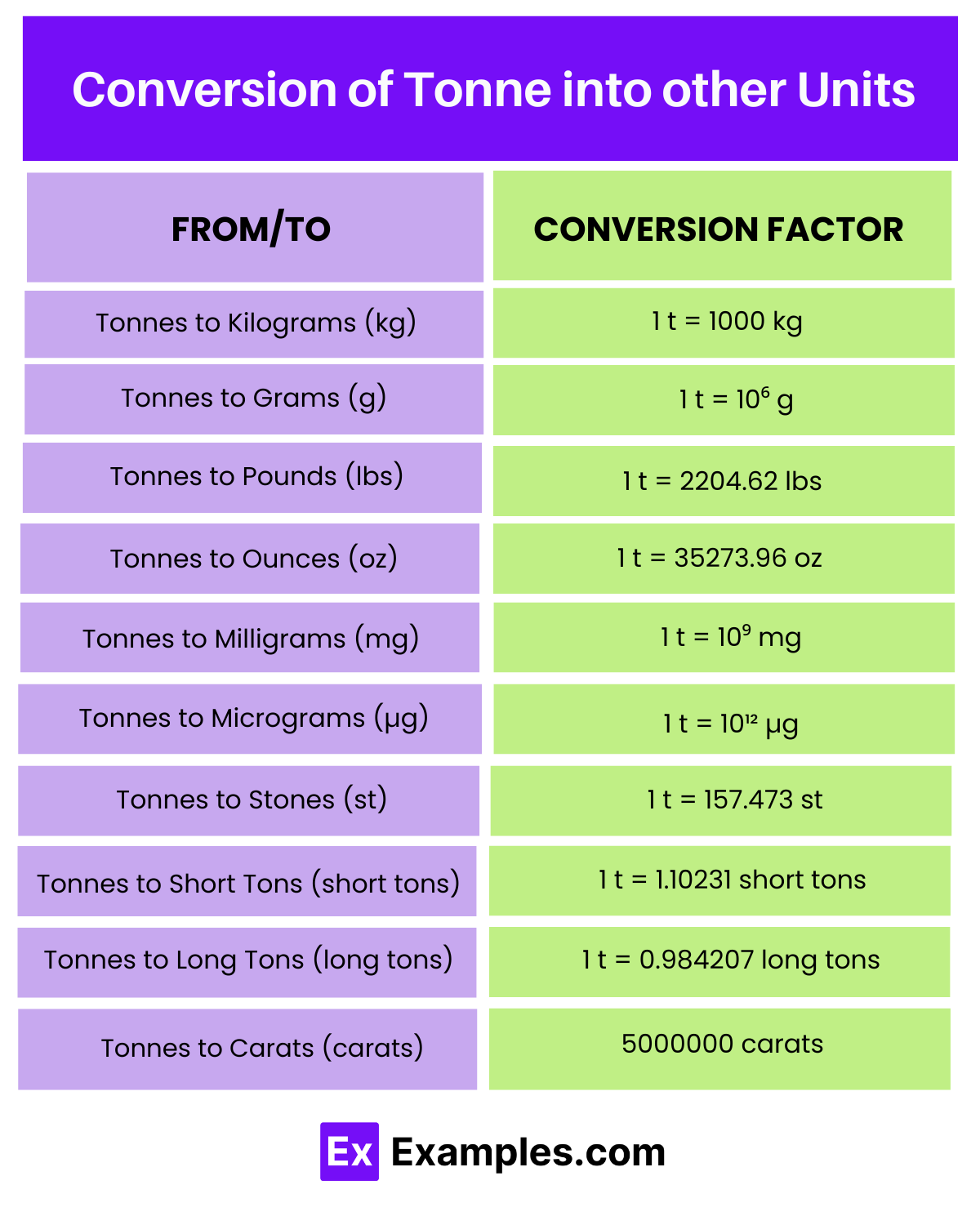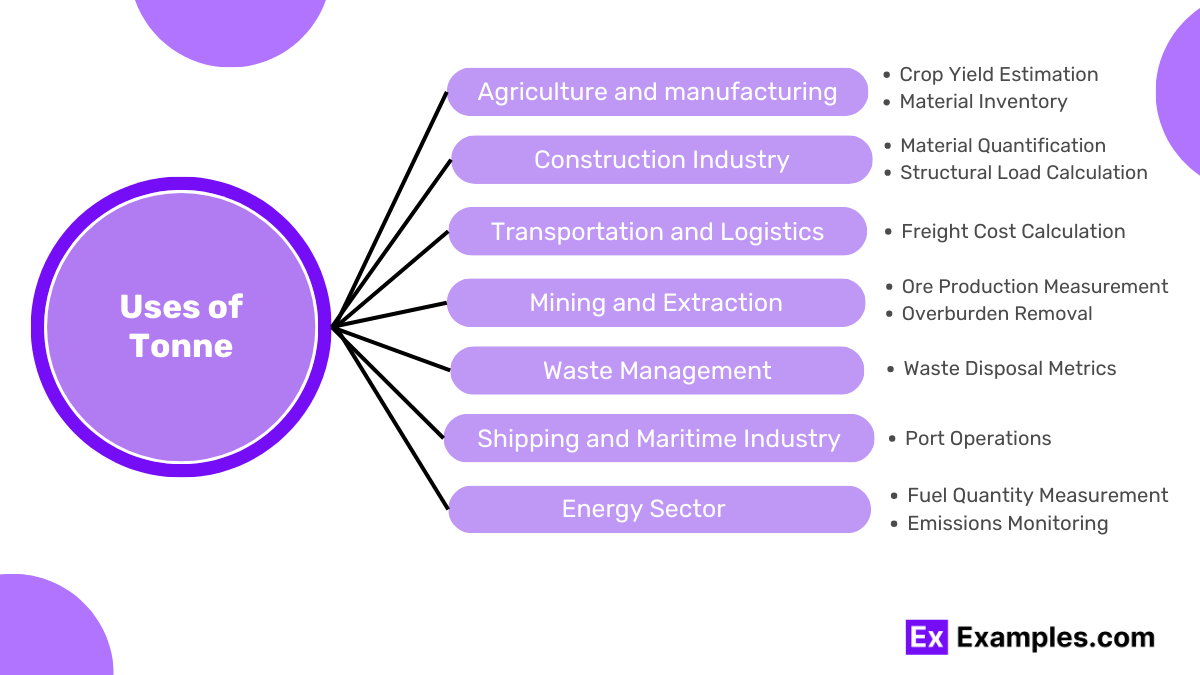What is the equivalent of 1 tonne in kilograms?
100 kg
500 kg
1000 kg
2000 kg


Tonne = Mass in kilograms ÷ 1000
| Unit | Symbol | Prefix | Value |
|---|---|---|---|
| Kilotonne | kt | kilo- | 1 kt = 10³ t |
| Megatonne | Mt | mega- | 1 Mt = 10⁶ t |
| Gigatonne | Gt | giga- | 1 Gt = 10⁹ t |
| Teratonne | Tt | tera- | 1 Tt = 10¹² t |
| Petatonne | Pt | peta- | 1 Pt = 10¹⁵ t |
| Exatonne | Et | exa- | 1 Et = 10¹⁸ t |

| From/To | Conversion Factor | Example |
|---|---|---|
| Tonnes to Kilograms (kg) | 1 t = 1000 kg | 10 t = 10000 kg |
| Tonnes to Grams (g) | 1 t = 10⁶ g | 10 t = 10⁷ g |
| Tonnes to Pounds (lbs) | 1 t = 2204.62 lbs | 10 t = 22046.2 lbs |
| Tonnes to Ounces (oz) | 1 t = 35273.96 oz | 10 t = 352739.6 oz |
| Tonnes to Milligrams (mg) | 1 t = 10⁹ mg | 10 t =10¹⁰ mg |
| Tonnes to Micrograms (µg) | 1 t = 10¹² µg | 10 t = 10¹³ µg |
| Tonnes to Stones (st) | 1 t = 157.473 st | 10 t = 1574.73 st |
| Tonnes to Short Tons (short tons) | 1 t = 1.10231 short tons | 10 t = 11.0231 short tons |
| Tonnes to Long Tons (long tons) | 1 t = 0.984207 long tons | 10 t = 9.84207 long tons |
| Tonnes to Carats (carats) | 5000000 carats | 10 t=50000000 carats |
In agriculture, tonne is used to measure the yield of crops such as wheat, rice, or soybeans harvested from fields. Farmers utilize this unit to estimate the quantity of produce obtained per hectare, aiding in crop management decisions and market forecasting. Additionally, in construction projects, tonne is employed to quantify the amount of building materials required, such as concrete, steel, or gravel. This ensures accurate procurement and budgeting for construction projects, optimizing resource utilization and minimizing wastage. Moreover, in logistics and transportation, tonne is vital for calculating the weight of goods being transported via trucks, trains, or ships, facilitating efficient loading, distribution, and freight costing.
| Ton (ton) | Tonne (t) |
|---|---|
| A unit of mass primarily used in the United States and United Kingdom, equivalent to 2,000 pounds. | A metric unit of mass, equal to 1,000 kilograms or approximately 2,204.62 pounds. |
| Commonly used in the US and UK for trade, commerce, and everyday measurements. | Widely used internationally in most countries, especially in scientific, industrial, and commercial contexts. |
| One ton is equal to approximately 0.907 metric tonnes. | One tonne is equal to approximately 1.102 short tons. |
| Not part of the International System of Units (SI) and not recognized in most countries. | Recognized as the standard unit of mass in the International System of Units (SI) and used in most countries worldwide. |

Tonnes are widely used in agriculture for measuring crop yields, in construction for quantifying materials like concrete and steel, and in transportation for calculating cargo weights. Additionally, they play a crucial role in waste management, mining, and energy production.
The tonne is preferred in international trade due to its uniformity and ease of use across different countries and industries. It provides a standardized measure that simplifies transactions and avoids the confusion of using multiple units of mass.
Tonnes play a vital role in environmental sustainability efforts by quantifying waste generation, emissions, and resource usage. They enable policymakers, businesses, and individuals to measure and manage their environmental impact, supporting initiatives to reduce carbon footprints and promote sustainable practices.
Text prompt
Add Tone
10 Examples of Public speaking
20 Examples of Gas lighting
What is the equivalent of 1 tonne in kilograms?
100 kg
500 kg
1000 kg
2000 kg
Which of the following is a correct conversion of 3 tonnes to grams?
3,000 g
30,000 g
300,000 g
3,000,000 g
If a truck can carry 5 tonnes, how many kilograms can it carry?
500 kg
2000 kg
5000 kg
10000 kg
How many tonnes are there in 10,000 kilograms?
5 tonnes
10 tonnes
15 tonnes
20 tonnes
What is the weight in tonnes of a 2500 kg object?
2 tonnes
2.5 tonnes
25 tonnes
250 tonnes
Convert 7.5 tonnes to kilograms.
750 kg
1500 kg
7500 kg
15000 kg
If a container weighs 1500 kg, what is its weight in tonnes?
1.5 tonnes
15 tonnes
150 tonnes
1500 tonnes
How many grams are there in 0.25 tonnes?
250 g
2500 g
25000 g
250000 g
Which of the following is larger?
1 tonne
1000 grams
1000 kilograms
1 pound
A ship can carry a load of 200 tonnes. How many kilograms is this?
20000 kg
200000 kg
2000 kg
2000000 kg
Before you leave, take our quick quiz to enhance your learning!

